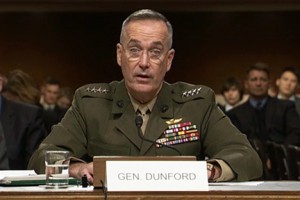Spooks in Wolf’s Clothing
We’ve known for some time that the military was rolling out its new-and-improved HUMINT function, the Defense Clandestine Service. But this article–laying out the ambitious goals of the program–is all the more interesting given several events that transpired since the NCS announcement: specifically, the Benghazi attack and the Petraeus resignation.
Part of the logic behind the move, the article explains, is that CIA is already overstretched; this will allow CIA to task DIA resources with the collection driven by military, rather than policy, needs.
The project was triggered by a classified study by the director of national intelligence last year that concluded that key Pentagon intelligence priorities were falling into gaps created by the DIA’s heavy focus on battlefield issues and CIA’s extensive workload.
Over and over, the article suggests the CIA is so busy in part because of its involvement in the drone program.
Through its drone program, the CIA now accounts for a majority of lethal U.S. operations outside the Afghan war zone.
[snip]
The CIA is increasingly overstretched. Obama administration officials have said they expect the agency’s drone campaign against al-Qaeda to continue for at least a decade more, even as the agency faces pressure to stay abreast of issues including turmoil across the Middle East. Meanwhile, the CIA hasn’t met ambitious goals set by former president George W. Bush to expand its own clandestine service.
If the drone program has sucked up CIA’s time, the agency doesn’t appear to be complaining about it. On the contrary, the recently-departed David Petraeus demanded more drones, not more resources for HUMINT.
The suggestion, then, is that CIA is too busy to collect HUMINT because it is so busy being a paramilitary organization.
But look at the topics DIA is said to be focusing on.
Among the Pentagon’s top intelligence priorities, officials said, are Islamist militant groups in Africa, weapons transfers by North Korea and Iran, and military modernization underway in China.
[snip]
“The CIA doesn’t want to be looking for surface-to-air missiles in Libya” when it’s also under pressure to assess the opposition in Syria, said a former high-ranking U.S. military intelligence officer who worked closely with both spy services. Even in cases where their assignments overlap, the DIA is likely to be more focused than the CIA on military aspects — what U.S. commanders in Africa might ask about al-Qaeda in Mali, for example, rather than the broader questions raised by the White House. [my emphasis]
With the argument thus laid out, Greg Miller might well have said, “DIA needs the DCS to avoid another Benghazi.” Read more →

